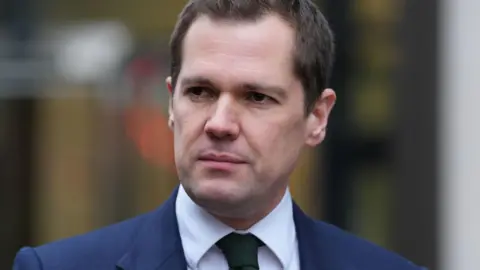The BBC has recently issued an apology after Dr. Krish Kandiah, a contributor to the Radio 4 Today programme’s “Thought for the Day” segment, accused shadow justice secretary Robert Jenrick of exhibiting xenophobic sentiments. This incident arose from remarks made by Jenrick in a newspaper article where he expressed concerns about having his daughters grow up near “men from backward countries” who supposedly entered the UK illegally and about whom little is known. These words, coupled with the context in which they were reported, prompted a strong reaction from Dr. Kandiah, who characterized such fears as xenophobia—an irrational fear of the unknown.
In his critique, Dr. Kandiah highlighted a pervasive societal fear that often surfaces regarding migrants and refugees. He pointed out that the language used by Jenrick echoed fears many individuals may harbor about strangers, particularly when these fears have been shaped by narratives of illegality and perceived threats. Dr. Kandiah went on to argue that while fear of the unknown is a common human reaction, succumbing to xenophobia can lead to harmful consequences, such as fueling protests and divisive sentiments within communities.
Robert Jenrick, responding to Dr. Kandiah’s accusations, argued that the message propagated by the BBC implied that parents worried about the safety of their children in the context of illegal migrants were being labeled as racist. He clarified his position, asserting that concern for the well-being of one’s family should be viewed as a legitimate parental instinct rather than a prejudiced stance. His viewpoint echoed throughout social media, where he emphasized that such concerns do not inherently equate to racism, but rather reflect a parent’s protective nature.
In addressing the controversy, the BBC acknowledged that while Dr. Kandiah’s message aligned generally with the intentions behind “Thought for the Day,” certain aspects of his language extended beyond acceptable boundaries. Consequently, the BBC took the step of editing out three specific sentences from the segment before it aired again on the catch-up service BBC Sounds. The edits came after significant backlash and scrutiny surrounding the strong implications made in the original commentary.
Dr. Kandiah’s remarks referenced a recent article by Jenrick in the Mail on Sunday, which continued to attract criticism. In that piece, he declared the rise in migrant crossings in the English Channel “a national security emergency,” underscoring a sentiment of empathy toward parents who feel overwhelmed by the pressures surrounding the issue of asylum seekers. This commentary shed light on the broader UK immigration debate, where statistics reveal that over 27,000 migrants have crossed into the country via the Channel since the beginning of the year. Although this number raises alarms, it represents merely a fraction of the UK’s overall immigration statistics, with an anticipated 948,000 people entering the country in 2024 while approximately 517,000 are expected to depart.
The BBC’s statement on the matter clarified that their apology was not an assertion of judgment regarding the validity or invalidity of the opinions expressed but rather an acknowledgment of the inappropriateness of certain opinions within the context of the program. This incident demonstrates the sensitive nature of discussions around immigration, particularly in the context of political discourse and public concerns.
The evolving narratives around migration and xenophobia, brought to the forefront of public discussion through the BBC’s programming, highlight the complexity of expressing and addressing fears and concerns through a sensitive lens. The BBC’s move to edit the segment not only responded appropriately to the backlash but also underscored the responsibility media outlets bear when navigating challenging social topics. This incident encapsulates a broader reflection on public sentiment towards immigration, family safety, and the language used in discourse surrounding these contentious issues.











